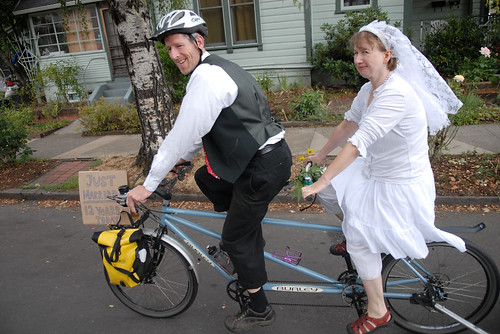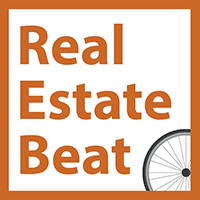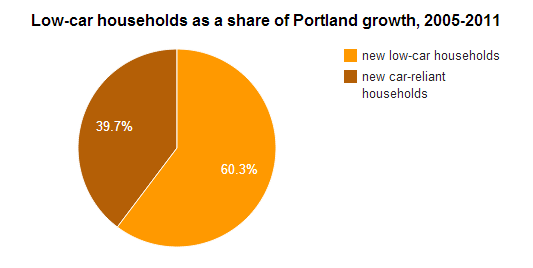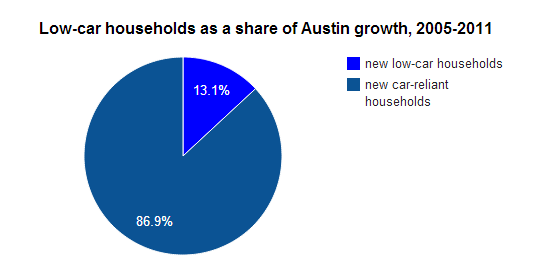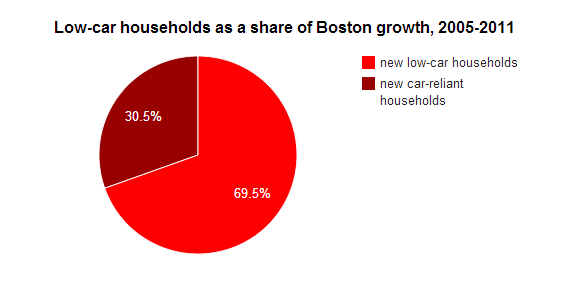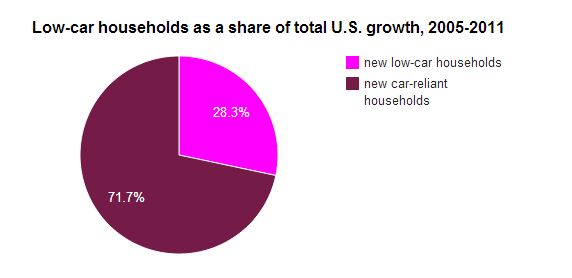There’s a very simple reason why Portland’s real estate market is shifting fast: Households whose members regularly get around without cars now account for about three-fifths of Portland’s net growth.
One in four Portland households now includes more adults than cars, according to the most recent Census estimates available, from 2011. (Figures for 2012 will arrive in September.) And though that’s not a massive behavioral change since 2005, when the figure was about one in five, the increase in this sort of household is huge as a share of net population growth.
And it’s that figure, net population growth, that drives the real estate industry.
This trend is so unusual in the United States that it’s no wonder that people who live in other cities often struggle to understand the way Portlanders go about their business and their lives.
For example, here’s the same chart for a city we’re often compared to: Austin, Texas. Austin is a bit larger than Portland (332,000 households compared to 251,000) and faster-growing (14 percent household growth within city limits since 2005, compared to 10 percent). But in Austin, only 13 percent of households lead low-car lifestyles, and such households only account for 13 percent of population growth:
To arrive at our index of the number of “low-car” households in a city, we add up annual Census estimates on the number of households that have either no car, or fewer cars in the household than workers (that’s people aged 16 and up who either have a job or are looking for one). A particularly popular category of low-car household in Portland: two workers, one car.
A few details: Roommates count as living in the same household only if they usually share their food. These statistics are based on weighted surveys taken by the Census every April, so they include modest margins of error, but changes like Portland’s are well outside that range. And despite our terminology in these charts, not every household that owns one car or more for every worker is truly “car-reliant.” But we think this is the best available measure of how Americans in a given city experience transportation.
Here’s the chart for Seattle, which like Portland currently has about 25 percent of its households leading low-car lives. But Seattle’s net growth in low-car households has been far slower than Portland’s:
A few U.S. cities are seeing faster net growth in the low-car population than Portland is. One of them is Boston, where half of households already lead low-car lives:
And here’s the chart for the U.S. population at large. Nationally, 14 percent of households include more adults than autos, and such households account for 28 percent of U.S. population growth:
It’s important to understand, as we think about what these numbers mean, that they don’t measure newcomers to a city. After all, people are constantly moving in and out of a city; about 9 percent of Portlanders arrived here in the last year, and about 7 percent of those who lived here a year ago have left. Also, households regularly increase or decrease their number of cars or workers without moving location.
Here’s what this statistic does show, though: in the last decade, Portland has developed a powerful, sustained and nationally unique demand for homes and jobs that are easily accessible by foot, bike and public transit. For example, 24 percent of two-worker Portland households now own only one car. Among Portlanders who live on their own, 30 percent don’t own a car at all. And among all Portland housing rentals, 27 percent don’t need car parking of any sort, because nobody inside owns one.
I’m not sure anybody has ever added up these numbers before and surveyed the full scale of Portland’s shift in real estate demand. But our local real estate market has been discovering them in its own way all the same. It’s this gradual discovery that our new real estate beat will be covering, almost every Tuesday morning, here on BikePortland. Stay tuned for more.


